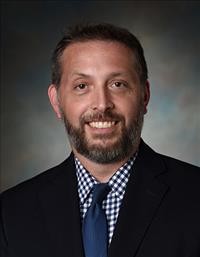
Many populations are impacted by the effects of COVID-19 and the crisis response, but children may be especially vulnerable to poor outcomes during this time.
Christian Connell, associate professor of human development and family studies and associate director of the Child Maltreatment Solutions Network, was recently awarded funding through a Penn State research initiative, the Coronavirus Research Seed Fund (CRSF), to study impacts of COVID-19 and child maltreatment. He is joined by collaborator, Michael Strambler, assistant professor of psychiatry at Yale University School of Medicine.
The CRSF is a community initiative to support research with the potential for significant and rapid impact on human health with respect to COVID-19 and SARS-CoV-2. In hopes to contribute in the COVID-19 crisis response, the Penn State research community sought research proposals that applied “unique research strengths” and showcased the university’s “world-class expertise.”
Connell’s proposal, the “Impact of COVID-19 Social Distancing Response on Family Wellbeing and Child Safety”, earned full funding from the Social Science Research Institute and the Huck Institutes of the Life Sciences.
A key component of Connell’s study is the stress factors many parents are facing during this unprecedented time. Households are experiencing school and work closures, social distancing, and potential exposure to an illness, and these stressors can greatly impact child safety and wellbeing.
“Social distancing measures, as well as school, child care, and workplace closures, while essential, result in children spending more time at home where they could experience increased incidents of child maltreatment by caregivers facing the strain of economic, work, and childcare pressures, among other stressors,” said Connell. “It is important to understand the effects of family stress on parenting challenges during this pandemic, so we can best allocate resources to support parents and children.”
Survey-based research will be conducted to measure parents’ levels of stress associated with parenting responsibilities or economic strain and the effects these Covid-19 related stressors are having on the care of their children.
Connell hopes to inform strategies to support vulnerable children and their families, especially while stay-at-home practices and school closures are in effect.
Connell’s work stood out amongst many other proposals as it exceeded evaluation criteria proving the research to be competitive on an international level and hold significant impact on human health relative to COVID-19.
Although the Huck Institutes of the Life Sciences is leading the CRSF, the Social Science Research Institute; the Materials Research Institute; the Institute for Computational and Data Sciences; and the Institutes for Energy and the Environment are also supporting the initiative.